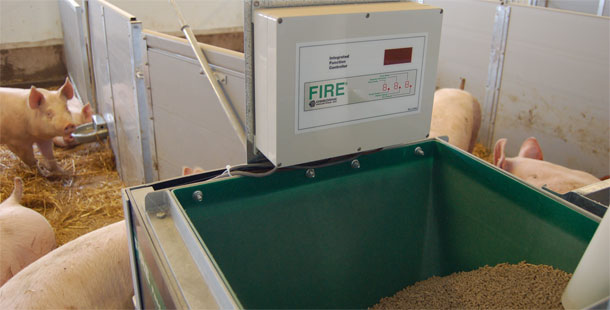 Leading global pig breeders and geneticists, JSR Genetics, have successfully won two prestigious Technology Strategy Board grants in conjunction with top UK academic partners.
Leading global pig breeders and geneticists, JSR Genetics, have successfully won two prestigious Technology Strategy Board grants in conjunction with top UK academic partners.
The recently awarded grants, totaling near £800k, have been allocated to projects firmly focused on efficiency and sustainability, highlight JSR’s on-going commitment to scientific advances supporting industry growth.

“We have always found links with academic partners to be very valuable,” says Dr Grant Walling, JSR Genetics’ Managing Director, “working well for all concerned, and so we are really delighted that, in coming together with both The Roslin Institute and Kent University, we have secured funding to pursue projects that will have real benefits for pig producers both in the UK and worldwide.”
Working alongside Professor Alan Archibald, Head of Genetics and Genomics at The Roslin Institute, JSR will be seeking to identify the ‘feed efficiency’ gene in pigs.
“We have the real advantage of being able to provide blood tests from thousands of JSR pigs for the Roslin laboratories to genome sequence, creating an individual DNA map of each one,” explains Stephen Waite, JSR Genetics’ Head of Science. “We are also recording the feed conversion ratio (FCR) of each animal using Feed Intake Recording Equipment (FIRE) feeders. These are located at our Newbottle Farm and will show which are the most feed efficient pigs. By examining their corresponding DNA profiles, we hope to identify those genes responsible for feed efficiency.”
The ultimate aim of the team is to be able to use SNP (Single Nucleotide Polymorphisms) chip technology – glass slides onto which DNA is bonded to represent genetic variants - to identify the most feed efficient pigs at the earliest opportunity.
“At the moment,” explains Stephen, “we have to wait until pigs reach around 91kilos before we can select for genetics. This innovation should accelerate the whole process: eventually we would like to be able to select for genetics at birth. In this case, as we are selecting for feed efficiency, a vital trait for all pig producers, the results will benefit the entire JSR range.”
The second research project, entitled “Pig IVF and genetics: a route to global sustainability”, will be undertaken in conjunction with Kent University’s School of Biosciences and The Bridge Centre, a leading IVF clinic. Involving the transport of IVF embryos, the project will be of particular interest to international customers.

Feed Intake Recording Equipment (FIRE) feeders
“Currently, sending genetics in the form of live animals to international customers can be complex and costly,” explains Stephen. “Each animal has to be individually tested at around £250 per animal, vaccinated, and travels in more spacious accommodation than most humans.”
By comparison, the transport of IVF embryos would involve a fraction of this cost and the environmental impact would be far less. Embryos suspended in a flask require just one test, can be ‘disease washed’ as required for their destination and can travel as luggage on a normal commuter flight.
“Working with the Bridge Fertility Centre and Dr Kate Fowler of the University of Kent, who we also sponsored as a PhD student, is an excellent example of the synergy these relationships create,” says Stephen. “At present, different people have managed to do different parts of the process but no one yet has managed to pull the whole process together. We think that there will be gains all round for both human and animal fertility. For JSR customers, it will provide worldwide access to the full range of JSR genetics in a more convenient and cost-effective way with substantial savings being passed down the supply chain.”
“Both this project and our work with The Roslin Institute are excellent examples of the value of bringing skills and expertise together,” says Dr Walling. “We all have something unique to contribute, and everyone benefits when we can join together in meeting the challenges ahead.”

April 5, 2012 - JSR Genetics

